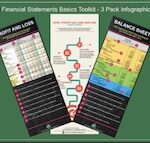Are Profitability KPIs in Your Budget Done the Right Way?
Did you know that Profitability KPIs are the most difficult in a Hotel Budgeting process?
Conceptually, you cannot budget for profitability directly.
I will clarify that later in the post.
What are Profitability KPIs anyway you ask puzzled?
Hang on, I am getting there.
Earlier, we visited revenue and expense KPIs in the hotel budgeting process.
I can now go as far to say this.
Grab this EXCEL Spreadsheet
Don’t miss our 5 Killer Hotel KPIs Dashboard
Get this exclusive Excel Template that you can customize to create your own 5 Killer Hotel KPIs Dashboard
If you budgeted for revenue and expense KPIs the right way, you have set up profitability KPIs.
That is, to some extent.
However, the job is not fully done.
This is because profitability has multiple flavors to it.
It is important to be clear which profitability KPIs you want to target.
I will lay out a strong case for just that in this chapter.
In the process, we will answer questions like:
- What are the key indicators of profitability?
- Do KPIs measure profitability?
- What is the KPI profit ratio?
Take a look at the infographic below on hotel budgeting and forecasting.
Click to watch the video on hotel budgeting and forecasting.
This is Chapter 4 of the Ultimate Guide on Hotel Budgeting and Forecasting.
This Chapter will cover:
What are Profitability KPIs in Budgeting?
Remember what I said just a while back?
That conceptually, you cannot budget for profitability directly.
What did I mean by that?
You were puzzled.
Let me clarify.
it boils down to a simple principle on how profit is calculated.
Bear with me if it sounds too basic.
It is important.
Profit = Revenue minus Expenses
So, what is the big deal about this you ask?
Well, the big deal is that as per the above principle profit is simply a result.
Once you have your revenue and expenses done, deducting latter from former will give you profit.
In other words, if you did your revenue, expense KPIs right, you should get profitability KPI as a result.
But the saga does not quite end there.
You might ask a question: why then budget for profitability KPIs?
Clarification coming right up.
Why Profitability KPIs in Budgeting?
Why should you budget for profitability KPIs if profit is already a result?
Well, this is because profitability can be calculated in different ways.
For example, when you say profitability KPIs, which of the following are you talking about?
- Total Operated Department Income
- Gross Operating Profit
- EBITDA
- Net Operating Income
- Income Before Taxes
- Net Income
Each of the above profitability KPIs have a different calculation.
Now do you see why profitability KPIs have to be budgeted for?
The main reason is that each KPI has a different calculation.
It is important thus to budget for each specifically.
There are a few things to watch out for in the process.
I will lay those down shortly.
Now let us get down to see the profitability measures listed above.
In this blog post, I will focus on the first two profitability KPIs.
So, on to the first one.
Total Operated Departmental Income Budget
Before I get into this profitability measure, let me quickly state something.
Universally, hotel financial statements have to follow what is known as Uniform System of Accounts.
Simply stated, it lays down guidelines including format for hotel financial statements.
Take a look at Paradise Hotel’s Income Statement (per Uniform System of Accounts) below:
A few things to note from the above extract while budgeting:
- First, notice the above section of Income Statement is all about revenue producing departments
- Here, the revenue producing departments are:
- Rooms,
- Food & Beverage and
- Retail.
So, how is the Total Operated Departments Income Budget to be calculated?
Well, as seen from the above extract, that comes from individual Department Income.
Notice how in the case of Rooms, Food & Beverage and Retail, four KPIs are shown:
- Revenue KPI
- Cost of Sales KPI (only for Food & Beverage and Retail)
- Payroll & Related Expenses KPI
- Other Direct Cost KPI
Individual Department Income is calculated as follows:
DEPARTMENT INCOME CALCULATION
Revenue
LESS: Cost of Sales
LESS: Payroll & Related Expenses
LESS: Other Direct Costs
EQUALS: Department Income
This goes back to what I said before.
If you have budgeted for revenue and expense KPIs correctly, the profitability KPI is set up.
Department Income is one such profitability KPI.
Notice also that the above four KPIs are shown in different versions as below:
- Actual - Current Month and Year To Date
- Budget - Current Month and Year To Date
- Variance - Current Month and Year To Date
- Last Year - Current Month and Year To Date
I am going to repeat something I said before.
Once you have your revenues and expenses done, deducting latter from former will give you profit.
Profit in these departments (Rooms, Food & Beverage and Retail) is Department Income.
So, Department Income is the first Profitability KPI to be budgeted for.
This profitability measure will apply to all income producing departments of the hotel.
And now on to what is probably the most important KPI in a hotel budgeting process.
Gross Operating Profit - Holy Grail of Profitability KPIs
If there is one profitability KPI that is universally applicable for hotels, it is Gross Operating Profit.
It is known in the hotel industry as the Index of Operating Efficiency.
That means, you must focus on what your Budget Gross Operating Profit is showing for your hotel.
See Paradise Hotel’s Income Statement below:
I have reproduced the Income Statement showing Total Operated Departments Income again.
There is a reason for this and I will shortly clarify.
Pay attention to the last two rows of the extract above.
Notice that the Gross Operating Profit is calculated as follows:
GROSS OPERATING PROFIT CALCULATION
Total Operated Departments Income
LESS: Undistributed Operating Expenses
EQUALS Gross Operating Profit ($)
It is thus important to say that this profitability KPI is influenced by two other KPIs:
- revenue KPIs and
- expense KPIs.
Increases / decreases in the revenue and / or expense KPIs will affect the profitability KPI.
GROSS OPERATING PROFIT % CALCULATION
Gross Operating Profit ($)
DIVIDED BY: Total Revenue (Note the first row in the image above)
EQUALS Gross Operating Profit (%)
Profitability KPIs - Budget Gross Operating Profit ($ and %)
Notice a few things from the Paradise Hotel Income Statement extract above.
Undistributed Operating Expenses are overheads that cannot be identified directly to one department.
These overheads are shown in the Income Statement as follows:
- Administration & General
- Sales & Marketing
- Property Operation & Maintenance
- Utilities
Gross Operating Profit is divided by Total Revenue (Not Total Operating Departments Income) to get Gross Operating Profit %.
Why is this?
It is because the comparison is between:
- Gross Operating (profitability KPIs) Profit with
- Total Revenue (revenue KPI)
Why not with Total Operated Department Income?
That is because Total Operated Department Income already has direct expenses (Cost of Sales etc) deducted from revenue.
This is a critical point that many hotel managers do not know about.
Wrapping up Profitability KPIs to be Budgeted for
So, what is the moral of the story?
The moral is that revenue and expense KPIs are important.
However, hotel owners are more particular about profitability KPIs
A major one being Gross Operating Profit.
So, getting your Gross Operating Profit KPI Budget right is key.
Consider that the hotel owners will ultimately be approving your budget.
Thus, it makes sense to have all your budgeting ducks (metaphorically speaking) in a row.
Chapter 5
In Chapter 5 of this Ultimate Guide on Hotel Budgeting and Forecasting we will bring up another important hotel budgeting basic - budget variances.
Over to you.
How do you treat profitability KPIs in your budgeting process?
What do your hotel owners look at the most in your budget?
Comment below, I will be keen on knowing your thoughts.
See you in the next chapter.
Other Chapters of Ultimate Guide on Hotel Budgeting and Forecasting
Sign up to Speed Tips - Learn in Minutes for more tips, strategies and secrets straight to your inbox.
12







